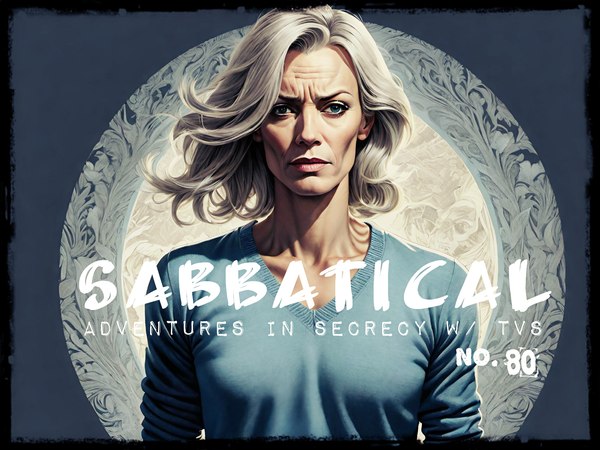Nice Folks
Three generations, on one swing
Mason and I went to see my dad.
He wasn’t doing well, Dad—or that’s what he kept saying. The docs all say he’s doing fine; they’re pleased with his progress. But he kept saying he wasn’t doing well, that he doesn’t feel right.
“I understand, Dad,” I say, “but the docs say you’re doin’ great.”
“Is that right?” he says.
We go outside, me and Dad and Mason. The three of us sit on the swing in the yard, in the sun.
Dad sat at the left end, Mason the right, so I sat down in the middle. I swear I didn’t contrive that for the book; it’s how it happened.
“We’ve got all three generations here,” I say, “on one swing.” It’s the sort of thing he used to say, back when his mind was whole.

He smiles.
Mason smiles.
I smile, too, I guess. I don’t know.
“How have you been liking the neighborhood?” I ask.
“The neighborhood …” he says, and I can tell he’s not sure what I mean.
“You remember the punks that used to tear ass down the alleyway there?” I ask.
“Yeah,” he says. “I yelled at them to stop.”
I smile. I’d picked that memory because I’d known he would recall it. It felt good to be right, and it felt good that he recalled it so easily.
“That’s the neighborhood we’re in,” I said.
“Oh, okay,” he said, and nodded.
“And there’s the neighbor, who’s a plumber.”
“That’s right,” he says. “He’s the plumber.” He said that second statement with masking confidence. I could see that.
“And there are kids across the street.” I turn to Mason and ask, “What are their names again?”
“Whaley and Herringbone,” they say.
Dad nods. I can see he doesn’t know what I’m talking about, so I try for another.
“And they have a mother … What’s her name?” I ask Mason.
“Smithly,” they say.
Dad nods and says, “Smithly. There’s a woman across the street named Smithly. She’s a nice lady. Has a couple of kids she looks after.”
“Right,” I say. “That’s the one. That’s the neighborhood we’re in.”
He nods.
“You guys have been here about a year now,” I said.
“Has it been that long?” he asked.
“Yeah,” Mason says, “because you guys moved in last Thanksgiving. Mom was talking about it the other day.” They look uneasily at me, but I just smile sadly, and pat their arm, which seems to relax their worry.
“Okay,” Dad says and nods.
“I don’t know much about this neighbor over here,” I say.
“Me eiffer,” Mason says.
“They’re nice folks,” Dad says. “I don’t have much interaction with them. You know, not much occasion for it. But they’re nice folks.”
I nod.
“I, uh … haven’t had much,” he says, “well I guess you’d call it ‘interaction’ with them.”
“I understand,” I say.
“But they’re nice folks,” he says again.
Just then, his attention is caught by something from across the alleyway: strange sounds coming from behind a fence there.
Again, I did not contrive this, though I am timing it to accommodate the fact that I heard these noises before my dad or my kid, but didn’t say anything.
“Is there somethin’ going on over there?” Dad asked.
“I think so,” I say.
What I could hear a was an irregular, repetitive clacking sound and some loud, strange vocalizations.
“Doesn’t he have a little golf course set up back there?” I asked. “The neighbor across the alleyway, I mean?”
Dad nodded. “Yeah. He’s got a little AstroTurf green set up back there.”
“Are those wiffleballs he’s hitting?” I ask. '“Making that clacking sound.”
“Probably,” Dad said. “You gotta hit ‘em pretty good to make ‘em sound like that.”
The clacking continued, and we heard then more of the vocalization.
“Is someone singing?” Mason asked.
“I think so,” I said.
Dad, who was a scratch golfer and a semi-pro singer looked at the fence from behind which these sounds were coming. Then, he looked the other way, at his house, and said, “I think I need to stand up and go back inside.”
Mason and I got up, then I walked in front of him, offered him both my hands, helped him stand up. Mom had left a walker, but he didn’t need it, so I spotted him as he walked back into the house.
To continue reading along the Dad path, click here.
Play procedures
- If you want to unlock the secret of time travel, you may count this chapter as one point toward doing so. If you don’t know what I mean, you may not until you do.
- Think about your own place in your family. How is it similar to or different from mine?
- You may collect the Tom Waits tune—either this isolated vocals version or any version you know—and add it to your inventory.
- If you want to speculate about what was actually going on in the neighbor’s backyard, you may. If you’re keeping a journal, write it down.





